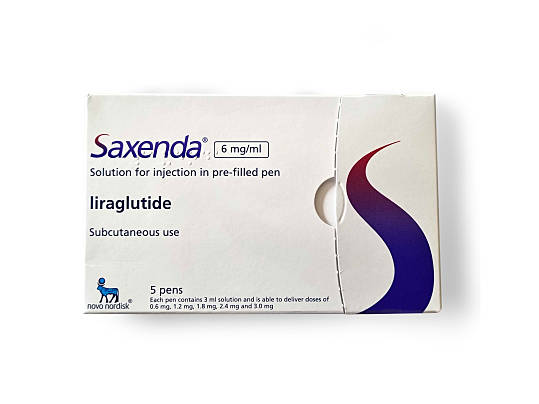Weight Loss Treatment
Order a prescription for your pharmacy of choice for weight loss treatment.
Simply fill in a brief questionnaire. One of our doctors will review your order and prescribe a suitable treatment. How to Order
If you are trying to lose weight, you might benefit from weight loss treatment prescribed by a doctor. We currently offer a variety of treatments including an easy to use injection pen (Saxenda), and weight loss tablets (Mysimba, Xenical).
To request treatment, simply answer some questions about your medical history. One of our IMC registered doctors will review your answers to check that treatment is suitable before prescribing this. You can use our service whether you're starting treatment or reordering medication.
Any weight loss treatment should be used together with a healthy diet and exercise plan.
We’re here if you need us
We understand that losing weight is an extremely personal journey. If you have any questions about weight loss treatment or your health at any stage, you can get free advice from our friendly team of qualified doctors. Just send them a message through your account.
Weight loss medication

No results found.
Please check your spelling or try another treatment name.



Weight Loss Treatment
What treatment is available for obesity?
The main treatment for obesity is exercise and a healthy, balanced diet. You can also use weight loss medication to help you lose weight. You may be eligible for weight loss surgery, but only if you have tried all other methods and they have not worked.
Obesity is a term used when someone has a lot of body fat. The best way to check your weight is by using a BMI calculator. You are classed as obese if you have a BMI of 30 or above, or overweight if you have a BMI between 25 and 29.9.
Medication
There are a range of weight loss treatments available that can help you lose weight. These need to be prescribed for you and can be used if you are obese, or overweight and have other medical problems that are affected by weight, such as diabetes or high blood pressure.
We currently offer prescriptions for Saxenda which comes in the form of an injectable pen. It contains the active ingredient liraglutide which affects the receptors on your brain that control appetite. This makes you less hungry, so you can eat less. It is injected once a day. Your doctor will give you a treatment plan, as Saxenda should be increased slowly over 5 weeks or longer. If our doctors prescribe treatment to you, they will review your weight regularly and make sure it is working as it should.
Other weight loss medications include tablets like orlistat, Xenical, and Mysimba though we do not currently offer these.
Any weight loss medication must be taken alongside a healthy diet plan and regular exercise.
How does prescription weight loss medication work?
Each prescription weight loss medication works in a slightly different way, as they contain different active ingredients.
Saxenda contains the active ingredient liraglutide. This acts like another hormone in your body called glucagon-like peptide-1 (GLP-1). Usually, after you have eaten a meal, your intestines release GLP-1 to tell your brain that you have eaten. Saxenda works the same way and sends signals to your brain that you are full, so you can eat less and reduce your weight.
Mysimba also works on the brain to reduce appetite levels but in a slightly different way. Meanwhile Xenical and orlistat work by changing how your body digests fat.
Exercise
Although a healthy and balanced diet can help you to lose weight, you also need to burn energy through regular exercise. It’s recommended that adults do at least 150 minutes of moderate intensity exercise every week. This can be split into 30 minute sessions, 5 times a week. Some exercise is better than none, so if you struggle to exercise you can increase this slowly, starting with 10 minutes a day.
Exercise has many health benefits and can reduce the risk of other illnesses that can affect your weight. The Health Service Executive (HSE) has more information about how being active can benefit your health.
Moderate intensity exercise is anything that increases your breathing and heart rate, so this can be different for everyone. Some common examples are:
- cycling
- power walking
- dancing
- swimming
You can also do 75 minutes of vigorous exercise every week if you have less time, or a combination of both. Vigorous exercise is anything that causes your heart to beat rapidly and breathe very hard, so that you could not hold a conversation. This includes:
- competitive sports like rugby, gymnastics, and boxing
- circuit training
- running
To help with weight loss, you should also do strength and balance exercises 2 times a week. You can build strength by carrying shopping bags or doing a strength based exercise like yoga or tai chi. Your local gym will have everything you need to work on your strength and balance.
As we spend a lot of our time sitting down, it is also vital that you break up sedentary (sitting) time by standing up and moving around. If you need help with an exercise plan, your GP, a weight loss advisor, or a personal trainer at your local gym can help create a plan for you. It is better to make small achievable goals that you can stick to. If you have never exercised before, you do not need to jump in with 75 minutes a week straight away.
If you are or have been obese, you may need to exercise more. To prevent obesity, you should do moderate intensity exercise for 45 to 60 minutes a day. For those who have been obese, it is recommended to do 60 to 90 minutes of exercise a day, or you may regain any weight that you have lost.
To make exercise a part of your daily life, find something that you enjoy doing or add social elements, by working out with your partner, family, or friends.
Diet
To lose weight at a safe pace of 0.5 to 1 kg a week, you should reduce your calorie intake by 600 kcals a day. Your doctor will help you with a diet plan if you need it. This is not about following a ‘fad’ diet, but about making healthier long lasting choices that will improve your eating habits for the rest of your life.
For women, weight loss can be achieved by consuming no more than 1,400 calories a day. Men should be eating no more than 1,900 calories daily. To lose weight, you should swap high energy and unhealthy foods for healthier choices. This means lowering your intake of processed food, fast food, and sugary drinks like sodas and alcohol.
A healthy and balanced diet should include:
- some dairy foods and milk
- some sources of protein such as meat, eggs, fish, and beans
- lots of vegetables and fruits
- some rice, pasta, bread, potatoes, and other starchy foods (ideally these will be wholegrain)
- only small amounts of foods or drinks that contain a lot of sugar or fat
If you are overweight or obese, try to avoid any foods that contain a lot of salt. This can increase your blood pressure, which could cause hypertension.
Read food and drink labels so you can work out how many calories you are having in a day. Drinking lots of water is the best way to cut out unnecessary calories in drinks.
You should avoid any ‘fad’ diets, as these are not healthy or realistic and tend not to work. They can make you feel ill and cutting out an entire food group or not eating for a long period of time (fasting) is not sustainable. If you want to follow a diet programme, make sure it:
- is not overly restrictive on what foods you can have
- educates you about healthy eating and portion sizes
- is based on losing weight safely and gradually, to achieve long term weight loss goals that are likely to last
If you are considering a very low calorie diet, which means consuming less than 800 calories each day, you should speak to your doctor. Only some people are suitable for this and if you are, you should not do it for longer than 12 weeks.
Surgery
Weight loss surgery can sometimes be used as a treatment for obesity. This is only available through the HSE via specialist weight management services.
Your GP may be able to refer you to a specialist centre if you:
- have a BMI over 40
- have a BMI over 30 and certain health conditions that weight loss could improve, such as type 2 diabetes
Specialist weight management centres offer medical and surgical treatment options and also involve diet, exercise and psychological support.
Side effects of weight loss treatment
Weight loss treatment can have side effects, just like any other medication. Not everyone will get them and these usually only last for a few weeks. If you get side effects whilst taking weight loss treatment and it does not go away or bothers you a lot, you can speak to our doctors. Some treatments such as Saxenda are increased gradually over time to reduce the chances of side effects.
Common Saxenda side effects
The most common side effects of Saxenda are:
- diarrhoea or constipation
- nausea or vomiting (feeling or being sick)
- headaches
- dizziness
- low blood sugar
- dry mouth
- redness or itching at injection site
Saxenda is increased slowly to reduce the chances of nausea and vomiting, which is the most common side effect.
Can you get weight loss medication over the counter?
Most weight loss treatments must be prescribed to you by a doctor and are therefore not available over the counter. This is because you need to meet special conditions to take these. For example, these treatments may not be suitable if you have certain health conditions or take other medications.
The only weight loss medication available over the counter in Ireland is Alli, a branded version of orlistat.

Dr Kathryn Basford is an IMC and GMC registered GP who works with our Irish team here at ZAVA. She graduated from the University of Manchester and completed her GP training at Whipps Cross Hospital in London.
Meet our doctorsLast reviewed: 11 Aug 2022








